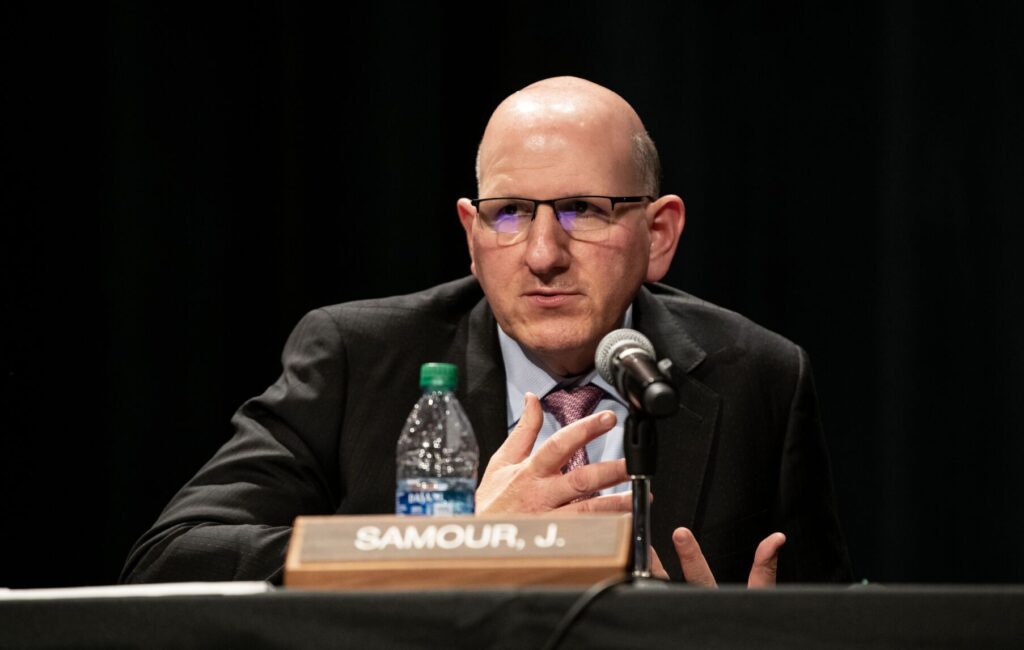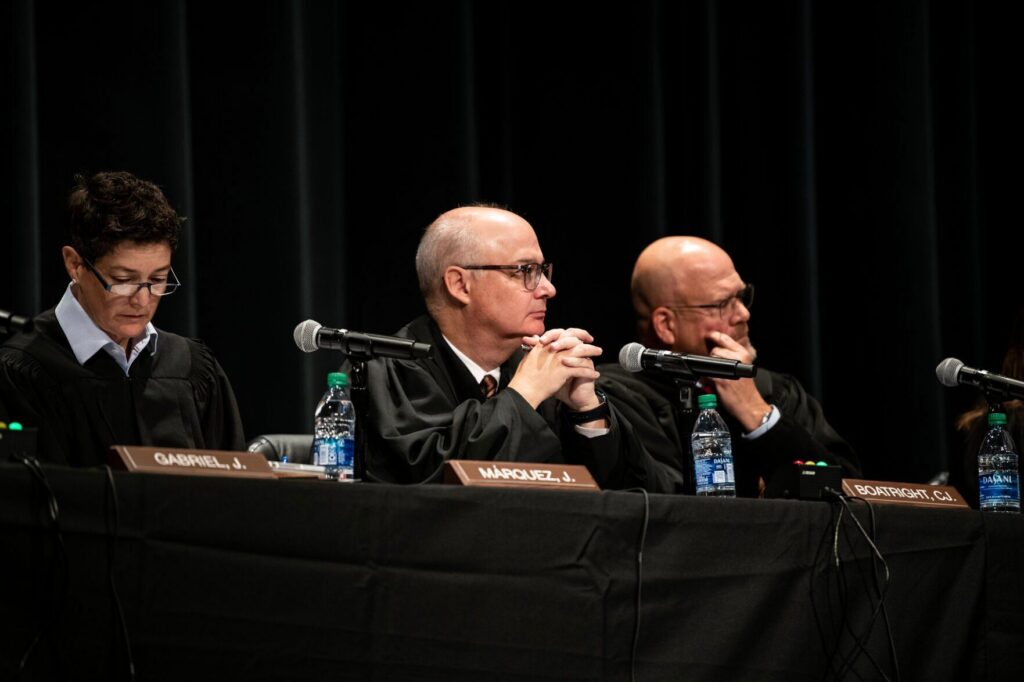Colorado Supreme Court weighs Xcel’s liability for man’s electrocution
The Colorado Supreme Court appeared hesitant on Tuesday to endorse the idea that the state’s utility regulator could use a rate-setting document to broadly immunize a company from liability against electrocutions.
Francisco Cuevas, the owner of Outdoor Design Landscaping, was hanging Christmas lights at a Lakewood woman’s home in late 2017 when he received a debilitating shock from nearby power lines. On the theory that the close proximity of the power lines electrified the tree, Cuevas sued the homeowner and Xcel Energy for his injuries.
The Court of Appeals allowed the lawsuit to proceed in part, reasoning that Xcel’s tariff, which sets the rates and terms of service for its customers, could not on its own provide immunity in such scenarios. Xcel appealed, pointing out the Colorado Constitution gives “all power to regulate the facilities, service and rates and charges” of utilities to the Public Utilities Commission — which approved the tariff containing immunity language for Xcel.
But during oral arguments, multiple justices were similarly uncomfortable with the idea that the commission’s constitutional power included granting immunity for electrocutions.
“It’s highly troubling to say that a tariff can give a utility the right to limit its own liability to anybody in the world,” said Justice Richard L. Gabriel.
“Imagine a scenario in which it’s not a defective line situation, but you have some form of negligence by Xcel that causes a huge fire, of the magnitude of the Marshall fire,” said Justice William W. Hood III to Xcel’s attorney. “Your position would be there’s a limitation of liability that essentially amounts to immunity in that situation?”
For its part, Cuevas’ company, Outdoor Design, appealed the Court of Appeals’ determination that it violated the High Voltage Safety Act by engaging in activity that reasonably could have brought employees within 10 feet of the power lines, yet failed to notify Xcel. That meant Outdoor Design would have to reimburse Xcel if a jury found the utility liable for Cuevas’ injuries — an outcome that Cuevas’ attorney acknowledged would end the lawsuit.
To determine whether Xcel could be held legally liable for Cuevas’ electrocution, Denver District Court Judge Stephanie L. Scoville initially looked to a section of the tariff. The document generally immunizes Xcel for “injury to persons” in close proximity to its power lines, unless the lines are defective. Scoville concluded the language “was intended to limit the utility’s liability for more than just customers,” meaning it applied to Cuevas.
She also determined the High Voltage Safety Act precluded Outdoor Design from holding Xcel liable because it had the duty to contact the utility before doing work near the power lines.
A three-judge panel for the Court of Appeals agreed state law barred Cuevas’ company, as the contractor, from bringing claims due to its failure to notify Xcel. But Cuevas himself was not precluded from doing so. The panel also disagreed that the tariff broadly immunized Xcel for injuries caused by its power lines to anyone, not just customers.
Tariffs have “contractual roots and regulate a utility’s provision of services to its customers,” wrote Judge Timothy J. Schutz, adding the legislature had said nothing about the immunity Xcel claimed it had.
On appeal to the Supreme Court, Xcel argued its tariff immunity for “injury to persons” meant what it said, without any limitation to customers. The company noted tariffs have the force of law, and argued the Court of Appeals was wrong to see it as just a contract between utility and customer.
“It really wouldn’t be a heavy lift to say to the legislature, ‘If you really intend to allow the PUC to have the authority to limit liability to anybody in the world, you should say that,'” said Gabriel. “Why shouldn’t we insist on that?”
“The constitution already has. ‘All power’ must mean all power,” responded attorney Franz Hardy.
“It doesn’t say all power for everything,” said Gabriel, noting the constitution specifically called out rates, charges and service.
Justice Brian D. Boatright added he was struggling to think of a commission-approved regulation that would not impact rates to some degree.
“Where’s the limitation?” he wondered.
“How do we write something that doesn’t just open the door to really ‘all power?'” echoed Justice Maria E. Berkenkotter.
Sean Connelly, the attorney for Cuevas, argued the court should simply hold that the tariff is a form of contract between customer and utility, and does not affect his client.
“If I walk out of the courtroom today and get run over by an Xcel truck, I’m not going to look to the tariff to see if I’m liable to them or not,” he said.
Meanwhile, Gabriel pressed the attorney for Outdoor Landscaping on the lower courts’ finding that it violated the High Voltage Safety Act because it failed to notify Xcel it was doing work on the tree, even if the company did not actually come within 10 feet of the power line.
“Here, they’re gonna put lights on the entire tree and I don’t think it’s disputed the line was within two feet of the top of the tree,” Gabriel said. “So, why would it not be reasonably expected that someone’s gonna get within two feet of that?”
“They’re professional landscapers. They’re not gonna get close,” responded attorney Eric D. Hevenor.
Justice Carlos A. Samour Jr. did not attend the arguments. Chief Justice Monica M. Márquez said Samour “is unable be here today,” but that he will participate in the decision.
The case is Public Service Company of Colorado v. Outdoor Design Landscaping, LLC et al.














